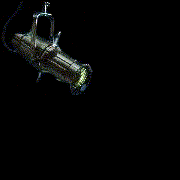

Created on August 7, 1998
To attempt dissection of the passage or ask for explanation is a vain effort, the experience is passed. What remains is retrospective revision, necessary and irrevocable. The words written here will be no exception. Though I prefer you suspend judgment and offer a belief that you view original form, it is nonetheless a result of endless experiments; permutations to maximize effect, striving for insight or essence, the novel -- a secret, hidden.
The experience itself is a part of the play. Who can bear witness to what actually occurs? During first play we are unable to distinguish thought from afterthought. No pen can capture the motions of the mind sweeping its alleyways clear of windblown trash and carefully pocketing clarity. Too many tasks to name each one in the recanting. The creature devours the carcass and cannot tell its tale. We have left but to sift through bones, shredded clothing, and occasional bits of flesh.
It is our nature to define and divide the process, polarizing one method against another on a linear continuum. Such measures may indeed have merit if the play itself were concrete, but it is not. It is an abstract unknown craft wherein the participant finds himself in progress before even he is aware the play has begun. Such is the method of exploration, of the drawing out toward our aspirations; its form is style, affinity, and habit - its substance is choice, causality, and adaptational structure.
...there is the seemingly simple decision to play and the process unfolds, as a rule, with relative ease. The screen turns momentarily black while the Game finds its breath; enough time, if you look closely and quickly, to see the reflection of one's own visage within the monitor's cavernous canvas. I have wondered if this fleeting vision is of our actual foe. The trumpet sounds! The tanks begin to turn and move about. Whatever face was there is now replaced with the colors of metal, earth, and discreet blue skies that loom uncaring, unnoticed while the crushing familiar assault is executed. A final frame of a frozen clash of wills - an aggressive mounted force upon another - dismissed with indifference, press the spacebar.
Another series of events follows in sequence. Dependent on the first play style each of these is given a measure of import from none to substantial. The clip begins. A General barks his advice, at times strangely specific to the scenario under consideration for play. Following, a pause; a QQP ghost reminding us that all things pass - disappearing or evolving. The Perfect General II opening screen - symbol of all it has been and become, almost a flag signaling a continued loyalty and participation.
The habitual resumes with option selections: typical New Game, Single Scenario, then the selection itself must be made. The music eventually ceases. The pounding of the drum's cadence eventually subsides while the possibilities scroll before us. A subsequent thoughtful decision, But even more to be made - more decisions based on history, predilection, or individuality.
The decision has been made which scenario will be played. Next, to do so immediately or review the recon map or description? A casual glance at the recon map provokes initial strategies or plans. Glance at the description and plans are altered, other methods present themselves, or limitations face you blankly, square-eyed, daring the attempt. Indicate acceptance and proceed with slight if any reflection; the creature himself unaware whether the inkling is innovation or recklessness; whether the choices will lead to victory or regret and despair. Who measures the blade with any thought that he might himself fall upon it?
Then the music again, permeating the process. It plays in the background, parading its chords of familiarity hypnotically prompting, pushing, the movement along. To attack or defend, comply with the author's wishes or defy the design? The long or the short version, what difference will it make? The balance is usually resigned to history - what we have found best works for us in the past. With rare exception we alter the past and select the course already laid by our own hand: partial kills, limited LOS, mines are hidden until found, environment is variable, units in cities repaired, and the delays - elapsed time to respond and react, to absorb the messages, to move our units from here to there, from now to then - while even now not a single unit has its hex of origin - verdicts rendered on unborn metal shrouds.
The play as we have come to define it has yet to begin. Yet even in this recanting we recognize the habitual, and routines always allow for the possibility of oversight; not the nature of rights or wrongs, corrects or incorrects. Simply nature. The orientation that one brings to the simplest beginnings often carries one into the greater whole --- the execution --- a precipice providing us the same perpetual view from which we flail our arms and practice the art of flight or falling.